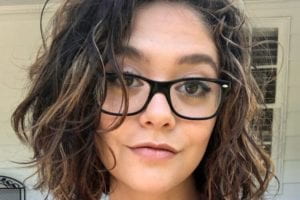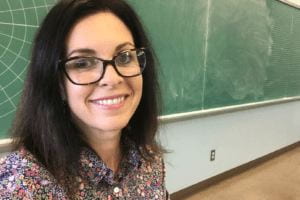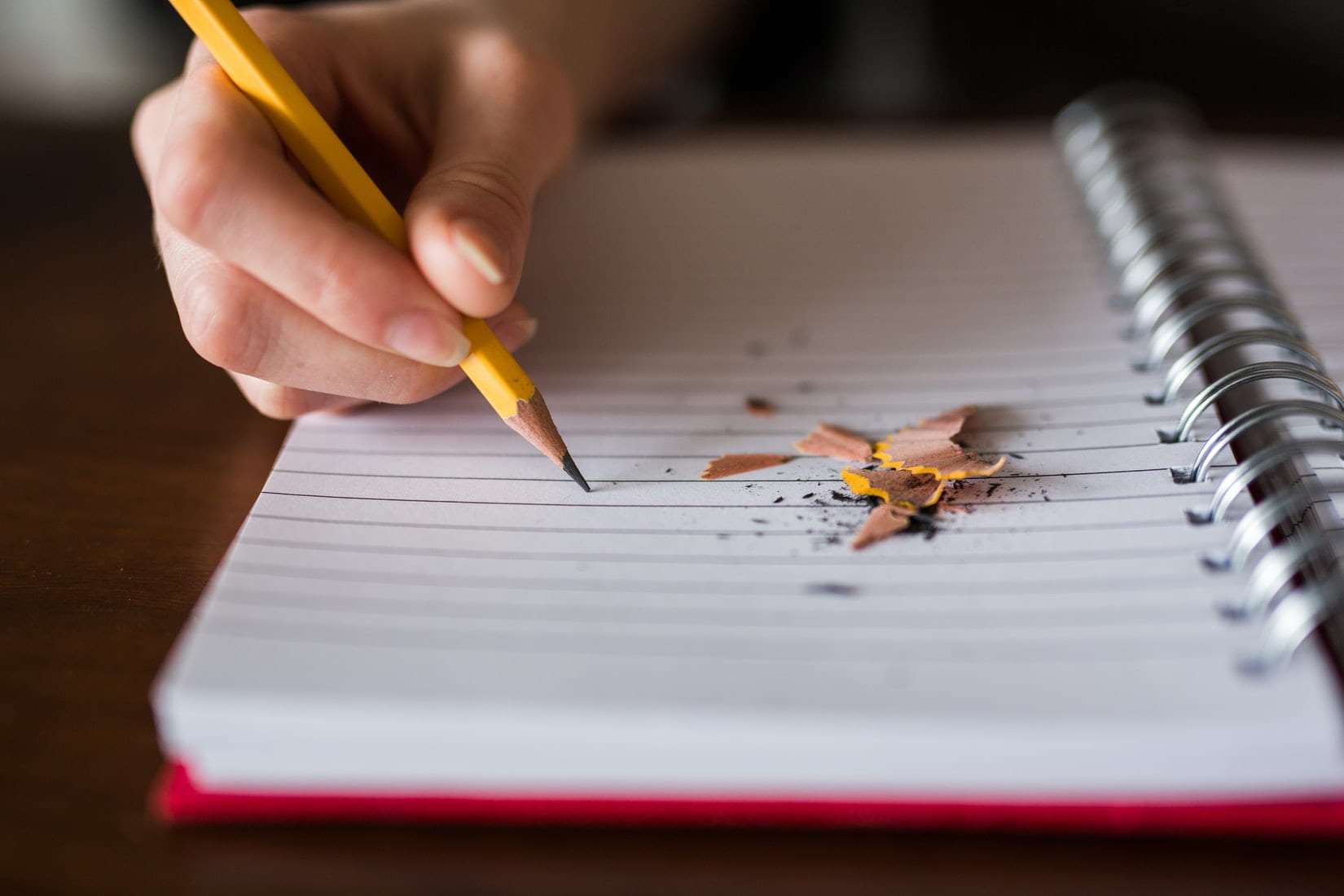School work and academia are stressful, especially when you’re also juggling other things, but some people find writing to be particularly so. So, with the end of the semester just around the corner, I turned to my fellow tutors at the Writing Studio to see what their writing processes look like, plus any tips and tricks they had for de-stressing the writing process.

What Are Some Examples of Tried and True Writing Processes?
Nellie: “My writing process flows as such: notes, outline, research, organization of research into categories aligned with body paragraph organization, writing the essay, editing the essay, revising the essay, proofreading.”
Bailey: “My writing process changes depending on what the goals are. BUT I can say that the technical part – outlining, setting deadlines, assigning word-count goals to sections/paragraphs – stays relatively constant. At the end of the day, a writing assignment is just another project to get done. Sometimes you’ll be fueled by a spark of inspiration (LOVE those days) and other times you’ll just have to set technical deadlines for yourself and make yourself write to meet them on time. Either way, you come out of the process with a product. I think we have this idea of the passionate writer typing away in a cozy office with a big glass of wine – and some days are definitely like this. But sometimes writing is just work, and that’s okay – just get it done.”
Jennifer: “I’m big into brain dumps and outlines. I’ll sit and get all my ideas out over a few different writing sessions. Then, I’ll go back and pick out my main ideas. I’ll use those ideas to create an outline, and then I’ll develop my ideas further in each section.”
Calabria: “I will brainstorm just to help get my ideas on the page, to see what points I’m trying to make, and to begin some initial organization. I like having my research done before I begin drafting, but I will continue to research as I realize I’ve left gaps in my evidence/support. I’ll create a rough draft, and then leave it for a day or two before submitting the final draft. I tend to leave it for that day, so I can get some distance between myself and the work. Otherwise, I’m too close to the work to really see what edits and revisions I should work through.”
Tyler: “I’ve recently begun to adopt outlining into my process, but honestly… taking notes. I take notes as I read what I’ll be writing on. Sometimes these notes are one-off, out there sentences. Other times, the notes end up turning into 400-500 word sections. So, if I view those 400-500 word sections as puzzle pieces, it just becomes a game of writing around those pieces (i.e. putting them together) in a way that makes sense.”
Is Procrastination Your Friend or Enemy?
Gabriella: “Unfortunately, I’m someone who functions best under a looming deadline. I try to give myself at least five days for the whole process. Most of my writing is research based, so once I establish what my approach for the essay is going to be, I look for scholarly articles to cite in my paper/use as support for my argument. If I’m having trouble in the brainstorming process, I’ll reach out to either a classmate or my professor to get some ideas. I’ll usually print out 5-10 articles relevant to my thesis and read them over the next day or so. This is helpful because it can help flesh out the details of my argument. Once I’ve annotated those sources, I sit down to write. I tend to write best from start to finish, beginning with my intro/thesis and move through my writing following the path I want my essay to take. Once I have a rough draft, I take a day away from it, and then go back to make small edits/adjustments. Then I send it to friends/family to get general feedback. My last step is usually an appointment at the writing studio to get an academic-minded pair of eyes on my essay. These sessions are always helpful because I have to explain my argument to another student, and if they can’t understand it from my writing, I know that I need to find new/different ways to support my claims.”
But it is just so overwhelming!!
Nicole: “I struggle with attention and become easily frustrated, and when I need to write, those two challenges seem to be magnified. My writing process follows the typical formula (planning, drafting, revising, etc). But, I learned that my process needs to have contingency plans for when challenges flare up. For me, switching writing modalities is really helpful (moving from computer to handwriting, for example). Also, if I’m stuck on one aspect, being able to pivot, calm down, and return to that frustrating bit later, makes me get less caught up in the fuss of writing. It became about knowing myself and listening to my emotions and really my body’s reactions to what I was doing and adjusting as I go–without abandoning the writing altogether!”
Natalie: “I like to have a plan of everything which I hope to include in my writing. Not necessarily in a specific order because I find that the appropriate order becomes apparent whilst writing. If I’m doing creative writing I like to have a very good grasp of the personalities of my characters before I begin writing so that I can accurately convey that through the whole piece.”
Leah: “I like to break down what I need to write in sections. I free write mostly and let whatever I need or want to say flow and then I revise and restructure as needed.”
How Do I Know I'm Done?
Dylan M: “I don’t thing there is a finished, just a place that we’re satisfied with our writing enough to submit it. Because of this, the approach I take for most writing is similar – identify expectations, examine examples of the genre, dump ideas on the page, revise for cohesion and flow, and then revise for brevity, diction and grammar. The idea dump I would say is the most important as it takes a lot of stress out of the writing process – once the main ideas are there I can work on making them into what I want.”
Karen: “My process is pretty simple and traditional. Prewriting is usually a web of ideas. For creative work I tend to write from the gut and then go back and edit. For academic work, I’ll write an outline and make sure all my loose ends are tied (evidence and arguments connected and supported). Then I revise. The tricky part is actually knowing when to stop revising. Any work is never going to be PERFECT, and that’s the beauty and frustration of writing.”
Personally, my writing process has changed over the years. Previously, for most of undergrad, I would write one draft and turn it in, no editing whatsoever. However, with longer papers, it became difficult and I found myself needing structure and to break it down into parts. Now I start by brainstorming a topic and writing out my thesis. Then, I research and attotate based on my thesis. After this I create an outline. For me, one of the hardest parts is getting started and staring at a blank page, so I trick myself into writing more by filling in the outline, first by saying “okay, bare minimum, write the topic sentences for these sections” and then once I get started writing, it’s easier to keep writing. Sometimes I’ll write it beginning to end, sometimes I’ll jump around. Editing and revising is difficult for me since I hate reading my own writing the same way some people hate the sound of their voice, so I try to leave the paper for a couple days before editing to get some space from it. I always try to keep in mind, though, and I tell tutees this when it comes up, that I can nit-pick and change words around all day, but eventually, the paper needs to be turned in. And when I do wait until the last minute, I always tell myself that I will do the best I can with the time I have left, and a good paper is a done paper.
In the end, there is no single “right” way to write. The best way to write is the way that works for you, and those of us here at the Writing Studio are always happy to help with that process. However, if you think you need a little more help, here are some other resources at GSU: [library resources] [counseling center resources].

A blog post by Emily Pierce
Emily is a second-year Master’s student in Literary Studies. Her research focuses on multicultural literature of the American South, and she is currently writing her thesis on Lillian Smith and Foucault. Out of the various projects people bring to the Writing Studio, personal statements are her favorite. She loves watching people grow into better writers and is excited to be working in the Writing Studio for her last semester.
 Gabriella: “Good writing is a myth–it’s a completely subjective construction. Different disciplines require different kinds of writing, and no one is well-versed in all of them. The first step to getting over the idea that you’re a bad writer is to understand that, internalize it, and remember that when you sit down to write anything. Sometimes the feeling that you’re not a good writer is the simple result of not being comfortable with writing, and the way you combat that is through practice. Confidence is key. My writing is never perfect, but I enjoy doing it, and I do it with some success because I’ve practiced enough to become confident in my finished product. I still frequently make simple (and sometimes not so simple) mistakes in my writing, but I keep at it because I know that effective writing is so useful as you go through life.”
Gabriella: “Good writing is a myth–it’s a completely subjective construction. Different disciplines require different kinds of writing, and no one is well-versed in all of them. The first step to getting over the idea that you’re a bad writer is to understand that, internalize it, and remember that when you sit down to write anything. Sometimes the feeling that you’re not a good writer is the simple result of not being comfortable with writing, and the way you combat that is through practice. Confidence is key. My writing is never perfect, but I enjoy doing it, and I do it with some success because I’ve practiced enough to become confident in my finished product. I still frequently make simple (and sometimes not so simple) mistakes in my writing, but I keep at it because I know that effective writing is so useful as you go through life.” Alina: “A good writer is one who strives to improve and does the revision necessary. Almost no one is a good first-draft writer. Good writers are those who have put forth significant effort in revision and have gotten help with their weaker areas. By getting help and working to improve, you have what it takes to be a good writer.”
Alina: “A good writer is one who strives to improve and does the revision necessary. Almost no one is a good first-draft writer. Good writers are those who have put forth significant effort in revision and have gotten help with their weaker areas. By getting help and working to improve, you have what it takes to be a good writer.” Dylan M: “‘The first step towards becoming a good writer is to understand that no one’s writing isn’t perfect, the second is to keep considering ways of improving our writing.’ A good writer is someone who puts in the practice and reflective work necessary for composing and revising their work.”
Dylan M: “‘The first step towards becoming a good writer is to understand that no one’s writing isn’t perfect, the second is to keep considering ways of improving our writing.’ A good writer is someone who puts in the practice and reflective work necessary for composing and revising their work.” Leah: “No Worries. Writing takes practice. I am glad that you came in so that we can work on some of the concerns you want to address.”
Leah: “No Worries. Writing takes practice. I am glad that you came in so that we can work on some of the concerns you want to address.” Nellie: “‘Good writers’ are writers who write regularly and often. Anyone can be a good writer. If we focus on what’s working well in your work and tinker with the things that are not, your writing will definitely improve.”
Nellie: “‘Good writers’ are writers who write regularly and often. Anyone can be a good writer. If we focus on what’s working well in your work and tinker with the things that are not, your writing will definitely improve.” 
















